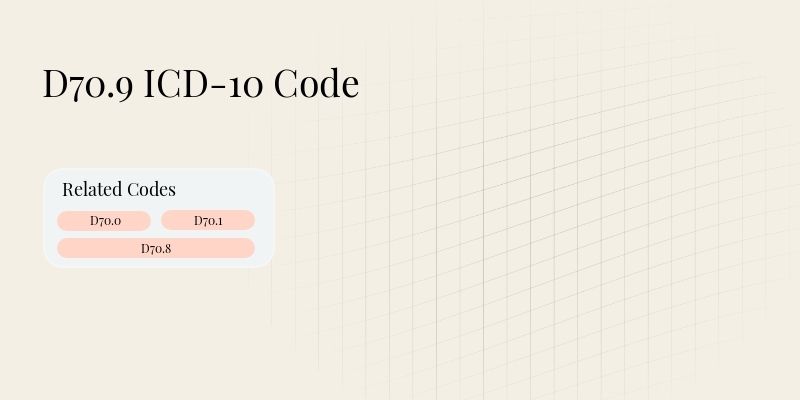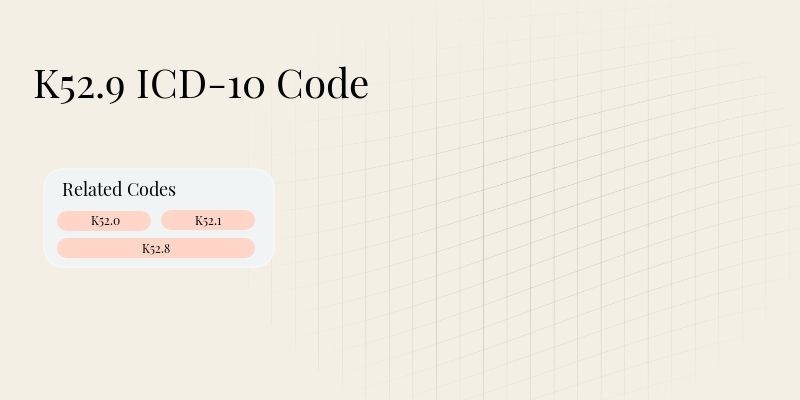
D70.9 ICD-10 Code: Neutropenia

Key Takeaways
- What D70.9 ICD-10 Code Covers: This code specifically addresses neutropenia, a condition characterized by an abnormally low level of neutrophils in the blood, which can increase the risk of infections. It is essential for capturing the severity and implications of neutropenia in clinical documentation.
- Session duration requirements: Documentation must reflect the duration of treatment or monitoring sessions, especially in cases where neutropenia is a result of chemotherapy or other medical interventions, to ensure accurate billing and reimbursement.
- Who can use the code: Healthcare professionals, including primary care physicians, hematologists, oncologists, and other specialists, can apply this code when diagnosing or treating patients with neutropenia.
- Best practice for proper use: Accurate documentation of patient history, lab results, and treatment plans is vital. This ensures appropriate use of the code and supports the medical necessity for services rendered.
- Example of actual usage: A patient undergoing chemotherapy who develops neutropenia may have the D70.9 code applied during their treatment plan, highlighting the need for increased monitoring and potential interventions.
What is D70.9 ICD-10 Code
The D70.9 ICD‑10 code represents "Neutropenia, unspecified," indicating a condition where the patient's neutrophil count falls below the normal range. Neutrophils are a type of white blood cell essential for combating infections, and a low count can lead to severe health risks. This code is crucial in clinical settings to identify patients at increased risk for infections due to their compromised immune response.
Neutropenia can occur from various causes, including bone marrow disorders, autoimmune diseases, or as a side effect of chemotherapy. Proper coding ensures that healthcare providers can appropriately manage and monitor patients and helps in tracking the prevalence and treatment outcomes of this condition across different populations.
Services Covered Under D70.9 ICD-10 Code
This code encompasses a range of services related to the diagnosis and management of neutropenia. The following table outlines the specific services covered:
Service | Description |
|---|---|
Complete Blood Count (CBC) | A routine test to measure the number of neutrophils and assess the severity of neutropenia. |
Bone Marrow Biopsy | Performed to evaluate the bone marrow’s ability to produce neutrophils, especially in unexplained cases. |
Infection Monitoring | Regular assessments for signs of infection in patients with neutropenia, crucial for prevention and timely intervention. |
Granulocyte Colony-Stimulating Factor (G-CSF) Therapy | Administration of medications to stimulate the production of neutrophils in patients with chemotherapy-induced neutropenia. |
Who Can Use the D70.9 ICD-10 Code?
This code can be applied by a variety of healthcare practitioners involved in the diagnosis and treatment of neutropenia. These may include:
- Primary Care Physicians: To diagnose and refer patients for further evaluation.
- Hematologists: Specialists who manage blood disorders and offer detailed assessments and treatments.
- Oncologists: Physicians treating cancer patients who may experience neutropenia as a side effect of chemotherapy.
- Infectious Disease Specialists: These providers often manage complications arising from neutropenia-related infections.
How to Use D70.9 ICD-10 Code
When applying this code, careful attention to clinical details is essential. Here are some guidelines:
- Documenting the Cause: Clearly identify if neutropenia is due to chemotherapy or an underlying condition. For example, a patient receiving treatment for breast cancer who develops neutropenia should have their chemotherapy regimen documented.
- Monitoring Frequency: Specify how often the patient is monitored for infections. For instance, a patient may require weekly CBC tests during chemotherapy to track neutrophil levels.
- Treatment Plans: Include any prescribed treatments, such as G-CSF shots, to demonstrate medical necessity. Documenting this helps support the use of the code during billing.
Reimbursement Rates for D70.9 ICD-10 Code
The reimbursement rates for this code can vary widely based on the type of insurance. The following table provides an overview:
Insurance Type | Average Reimbursement Rate |
|---|---|
Medicare | $120 |
Medicaid | $90 |
Private Insurance | $150 |
Disclaimer: Reimbursement rates fluctuate frequently and depend on various factors, including geographical location and specific insurance plans. We strive to keep this article updated with average prices.
Benefits of D70.9 ICD-10 Code
Using this code brings several advantages to healthcare providers and patients alike. The table below outlines the benefits:
Benefit | Importance |
|---|---|
Accurate Diagnosis | Helps in the correct identification of neutropenia, ensuring timely interventions. |
Improved Patient Monitoring | Enables healthcare providers to track patients at risk for infections, leading to better outcomes. |
Effective Treatment Planning | Supports the need for interventions like G-CSF therapy, thus enhancing patient care. |
Insurance Reimbursement | Facilitates appropriate billing, ensuring that healthcare providers are compensated for their services. |
Common Mistakes to Avoid with D70.9 ICD-10 Code
Incorrect coding can lead to audits, denials, and delays in reimbursement. It is essential to be aware of common pitfalls to ensure compliance and accurate billing. Below are frequent mistakes:
- Failing to Specify the Cause: Not documenting the underlying cause of neutropenia can lead to denials. For example, a physician may code for neutropenia without indicating if it’s due to chemotherapy.
- Inadequate Documentation of Severity: If the severity of neutropenia is not documented, it can result in lower reimbursement. For instance, failing to note critical lab values can affect treatment decisions.
- Not Updating Patient Records: If a patient's condition changes, such as improvement or worsening, not updating the records can lead to incorrect coding. For example, if a patient’s neutrophil count rises post-treatment and is not reflected, it may mislead the treatment plan.
- Using the Code Without Clinical Justification: Applying the code without sufficient clinical evidence can lead to compliance issues. For example, coding for neutropenia based purely on symptoms without lab confirmation is a common error.
D70.9 ICD-10 Code vs other codes
Understanding how this code compares to other related codes is vital for accurate coding practices. The table below highlights differences between similar codes:
Code | Description | Specificity |
|---|---|---|
D70.0 | Neutropenia due to drug therapy | More specific, indicates drug-induced neutropenia. |
D70.1 | Neutropenia due to an underlying disease | Specifies neutropenia caused by a specific underlying condition. |
D70.9 | Neutropenia, unspecified | General code for neutropenia without details on cause. |
Conclusion
The D70.9 ICD‑10 code effectively captures the critical condition of neutropenia, which can significantly impact patient health through increased infection risk. Understanding its application is vital for healthcare providers, as accurate documentation and coding ensure appropriate treatment, monitoring, and reimbursement. A variety of services related to neutropenia can be covered under this code, including blood tests and specific therapeutic interventions.
Finally, comparing this code with similar ones helps clarify its specific use cases and reinforces the importance of precise coding in clinical practice.
Disclaimer: This article is for informational purposes only and does not constitute legal or medical advice. Always consult professional guidelines and regulatory bodies for specific compliance requirements.
Frequently Asked Questions
Reduce burnout,
improve patient care.
Join thousands of clinicians already using AI to become more efficient.

F41.1 ICD-10 Code: Generalized Anxiety Disorder
Discover essential insights on the F41.1 ICD-10 Code code for health professionals. Enhance your practice and navigate billing with confidence.

K52.9 ICD-10 Code: Chronic Diarrhea
Discover essential insights on the K52.9 ICD-10 Code code for health professionals. Enhance your practice and navigate billing with confidence.

F33.0 ICD-10 Code: Major Depressive Disorder
Discover essential insights on the F33.0 ICD-10 Code code for health professionals. Enhance your practice and navigate billing with confidence.
